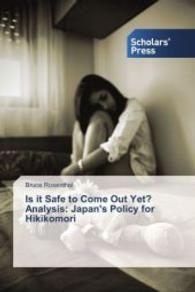- ホーム
- > 洋書
- > ドイツ書
- > Social Sciences, Jurisprudence & Economy
- > Politics, Society, Work
- > political science
Full Description
This book explores foreign policy developments in post-colonial Africa. A continental foreign policy is a tenuous proposition, yet new African states emerged out of armed resistance and advocacy from regional allies such as the Bandung Conference and the League of Arab States. Ghana was the first Sub-Saharan African country to gain independence in 1957. Fourteen more countries gained independence in 1960 alone, and by May 1963, when the Organisation of African Unity (OAU) was formed, 30 countries were independent. An early OAU committee was the African Liberation Committee (ALC), tasked to work in the Frontline States (FLS) to support independence in Southern Africa. Pan-Africanists, in alliance with Brazzaville, Casablanca and Monrovia groups, approached continental unity differently, and regionalism continued to be a major feature. Africa's challenges were often magnified by the capitalist-democratic versus communist-socialist bloc rivalry, but through Africa's use and leveragingof IGOs - the UN, UNDP, UNECA, GATT, NIEO and others - to advance development, the formation of the African Economic Community, OAU's evolution into the AU and other alliances belied collective actions, even as Africa implemented decisions that required cooperation: uti possidetis (maintaining colonial borders), containing secession, intra- and inter-state conflicts, rebellions and building RECs and a united Africa as envisioned by Pan Africanists worked better collectively.
Contents
Chapter 1: The Beginning of a Post-Colonial Foreign Policy in Africa.- Chapter 2: Conceptual Approaches to Foreign Policy and Application to African Countries.- Chapter 3: Politics of Geography, Statehood, Residual Colonization and Territorial Integrity.- Chapter 4: Africa Huru! Complex Events - Cold War, Residual Colonization and Apartheid.- Chapter 5: Nation vs. Continent: Sovereignty, Territorial Integrity and Rebellion.- Chapter 6: Made in Europe: Breaking Nations, Secession Movements and OAU Responses.- Chapter 7: Region or Continent: O/AU Development and Regional Economic Communities.- Chapter 8: Between BRICs' Promise and Past Western Trauma: Whither, Africa?.- Chapter 9. Africa's Post-Colonial Foreign Policy: Assessing History, Imagining the Future.







